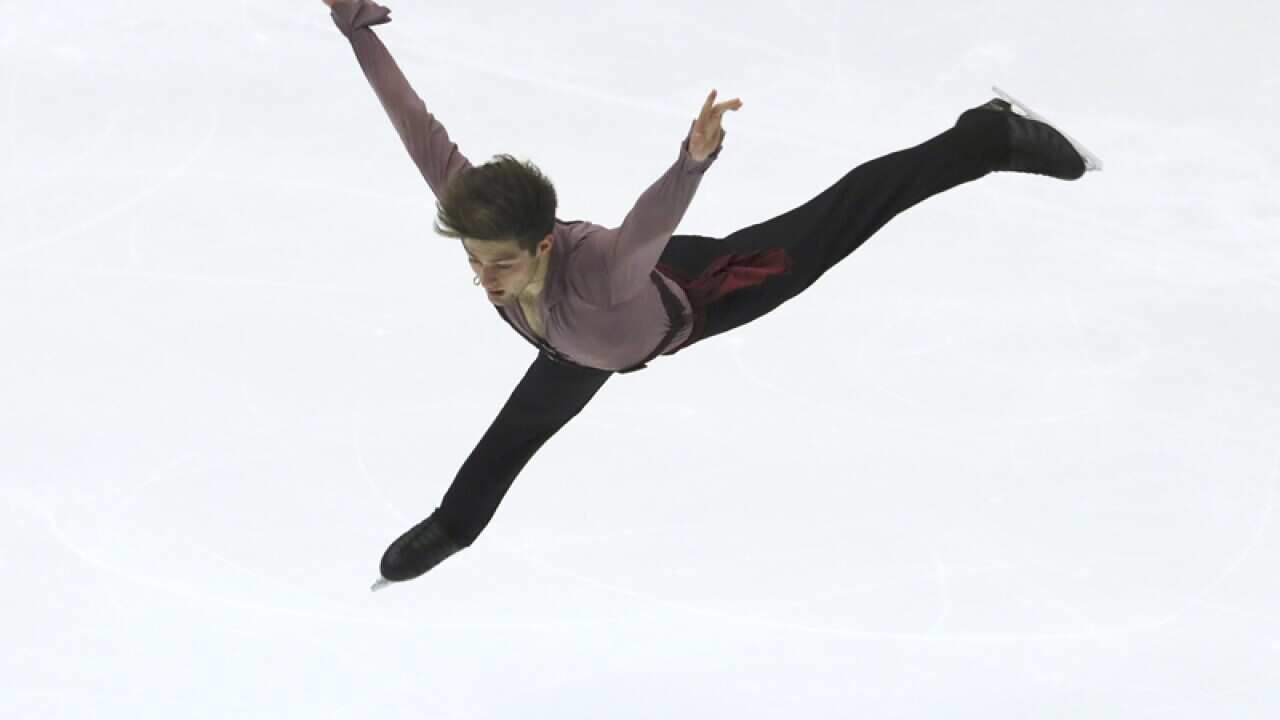Hijabi figure skater Zahra Lari shot to fame this year as the United Arab Emirates’ first competitive figure skater.
But what many people did not know was one of those behind her success was Australian skating coach Emilia Ahsan.
Russian-born Ahsan worked with Lari for a year as the head coach of the UAE’s Emirates Skating Club, honing her technique and skating skills with a very specific goal in mind.
“Her ultimate goal is the represent her country at the Winter Olympics, to be the first to represent her country at the Winter Olympics,” Ahsan told SBS News.
“In the Summer Olympics they’ve got someone contesting for the Emirates but no-one yet for the Winter Olympics.
“She’s obviously reached the goal of being able to compete in ISU events, so international competitions, just not the championship events just yet, so that’s her next step.”
While the middle of the desert may seem like a strange place to be training a winter sport, Ahsan wasn’t shocked when her name was put forward to build the UAE’s figure skating team. “I guess being a figure skating coach in Australia and having skated for Australia, Australia’s also not one of the first places you’d think when you think of ice, so it didn’t shock me that much,” she said.
“I guess being a figure skating coach in Australia and having skated for Australia, Australia’s also not one of the first places you’d think when you think of ice, so it didn’t shock me that much,” she said.

Former UAE national figure skating coach Emilia Ahsan. Source: YouTube
“I kind of expected it to be coming from those nations, but definitely was excited to hear that they were developing in that direction with their sport.
“New nations are coming up all the time. India was the first one that broke through that sort of shock that they had a figure skater on the world standings.
“You kind of look for the next countries that are going to bring out the next figure skaters.”
Ahsan competed for Australia as a junior in 2003 and 2004 and was also a two-time Australian national champion.
She said one of the big differences between coaching in the UAE and her home in Brisbane was the infancy of the UAE’s program.
“My day-to-day job doesn’t really change in terms of you’re developing a skater and you’ve got to make the same plans and adjustments if things go wrong or if things go well,” Ahsan said.
“The difference is, because the sport isn’t developed your job does take on other roles of trying to educate people within facilities even of how you should upkeep ice, how you should take care of it, what sort of conditions you should have and even educating people as to what training sessions should be like.”
Ahsan said the lack of understanding in the country could affect the quality of a training session, particularly with a high level skater like Lari.
“We’re used to figure sessions where we’ll have the ice cleaned by the machine and you’ll have levels segregated, so you’re not skating amongst hundreds of other skaters, whereas over there some days no-one does the ice, or they don’t want to put the lights on, or it’s just a public session, so she’s trying to train jumps amongst public skaters that aren’t figure skaters that are just there to have fun and chat with their friends,” she said.
Watch: The Australian coach who behind the UAE's first figure skater
“It does change the training and it makes it harder to follow your plan if some days you just can’t train because the conditions aren’t good enough.
“It’s frustrating on my part because I’ve seen it done right and it takes time for things to change and to educate people and for them to want to understand the sport and make adjustments and compromises for that, and it’s hard for her because she’s wants to achieve, she wants to come to every session and feel like she’s achieved something and not wasted some time coming in.”
Aside from the technical challenges, there were also cultural challenges in bringing Lari to figure skating’s world stage.
One of these was her hijab, something skating judges had never encountered as part of a costume.
“The first international competition she ever went to they wanted to deduct her for that costume piece because that’s not something that’s ever been seen before,” Ahsan said.
“I think because it’s something new I think they wanted to have a look at the head scarf and how it sat to make sure it wasn’t going to fall off or come off on the ice, so that was the first challenge, but since then no-one’s given her any deductions for costume.”
Lari has her detractors who say her participation in a sport that requires performing in skin-tight costumes in unIslamic, but Ahsan says there is also a lot of support.
“Certainly, through interviews and through social media, there is always going to be people that disagree and have more extreme and conservative views, which still look backwards and don’t think this is an appropriate thing for a woman to do,” she said.
“All in all, her country does support her, there is lots of support, and UAE is a much more forward, progressive and contemporary country than its Middle Eastern neighbours, and certainly her family is on her side and there are lots of people who support her and want her to do really well.”
But despite these challenges Ahsan, who is now back in Australia, says she sees a future for figure skating in the UAE.
“I think it’s fantastic that they have Zahra pushing so hard and really taking it in her stride and it’s great that she’s doing a lot of media and publicity, because without that there’s not going to be the knowledge and there’s not going to be the desire for other people to come and it will change the minds of people in the country,” she said.
“There’s other women in the UAE who are doing other sports, which is already pushing parents to think they can take their kids to sport.
“Just because they’re girls they don’t have to stop as soon as they turn 12 or 13.
“I do think, with all of that change, they will be able to figure out a way that it become more and more popular, which will then – having more people come and do the sport will mean the facilities are taken care of better and specifically for figure skating and more ice time is given to figure sessions rather than just public.”
Related reading

Aussie skater on track for second Olympics


